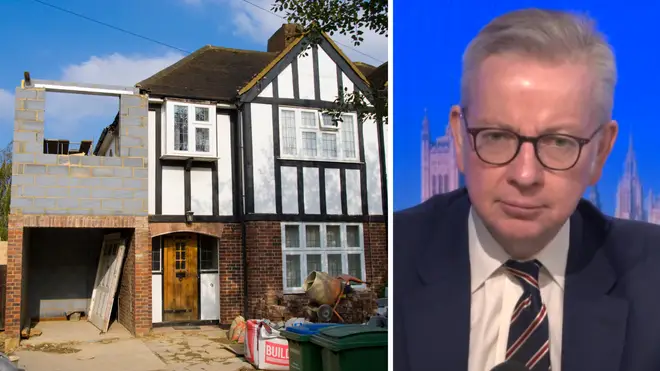
Shelagh Fogarty 1pm - 4pm
11 May 2022, 10:09 | Updated: 11 May 2022, 10:13

Neighbours could be allowed to vote on whether planning permission should be given for developments on their street, according to Government plans unveiled in the Queen's Speech.
As part of the Queen's Speech, Prince Charles said on Tuesday that "the planning system will be reformed to give residents more involvement in local development" as part of the Levelling Up and Regeneration Bill.
The bill was said to "give communities a louder voice", after previous attempts to reform planning were paused amid Conservative resistance.
Communities will be able to vote on whether planning permission should be granted for extensions to existing homes on their street.
Residents will also be allowed to decide rules governing the layout and materials used for new developments.
The Times reported that local residents will be permitted to hold referendums over the style and size of extensions, new homes and conversions on their street as well as deciding whether more loft conversions and conservatories can be built without full planning permission.
The bill, one of 38 set out on Tuesday, will seek to drive local growth and regenerate towns and cities across England, including by enshrining the Government's levelling up "missions".
Read more: Historic first as emotional Charles delivers Queen's Speech after Monarch pulls out

Expert breaks down government's 'ambitious' Queen's Speech
Levelling Up Secretary Michael Gove said previously "dormitories" had been built instead of neighbourhoods adding: "Communities have been understandably resistant because new buildings haven't been beautiful, they haven't been built with the quality required."
He vowed to target the "astronomical profits" of big developers, using the raid on profits instead to fund schools, roads and GP surgeries.
Mr Gove told the BBC: "Communities have been resistant because the infrastructure that they need - the GP surgeries, the new primary schools, the roads - haven't come with those houses.
"People are resistant to development because the environment hasn't been protected and enhanced in the way that it should be and people have been resistant to development because too often you have simply had numbers plonked down simply in order to reach an arbitrary target. You have had dormitories not neighbourhoods.
"People, when it comes to housing development, should be partners. We are going to do everything we can in order to ensure that more of the right homes are built in the right way in the right places.
"I think it is critically important that even as we seek to improve housing supply you also seek to build communities that people love and are proud of."
Read more: 'No, no, no': Gove rejects emergency budget calls in clash with Nick Ferrari

Prince of Wales reads Queen’s Speech in full
But speaking during a debate in the House of Commons on the Queen's Speech, Conservative former housing secretary Robert Jenrick warned the Government will miss its 300,000 homes-a-year manifesto pledge "by a country mile".
Mr Jenrick raised concerns that the number of homes built under Boris Johnson's first year in office will be the "high-water mark" for "several years to come".
The former secretary of state for housing, communities and local government, who was sacked by Mr Johnson in September 2021, said: "It is a matter of the greatest importance to this country that we build more homes.
"Successive governments have failed to do this. There's always an excuse."
He added: "We've got to get those homes built because we're letting down hundreds of thousands of our fellow citizens. People are homeless today because we're failing to build those houses.
"Young people's rightful aspiration to get on the housing ladder is being neglected because we're not building those homes.
"If I had to guess, I would say that the number of homes we built in the first year of this administration under the Prime Minister and myself, almost 250,000, will be the high-water mark of the number of homes built in this country for several years to come, and that the Government will miss its 300,000 homes-a-year manifesto pledge by a country mile.
"The only way in which we will get back to 250,000 homes a year and exceed it is if we together, on a cross-party basis, agree that that is not good enough and that we need to build more and find ways of doing that."